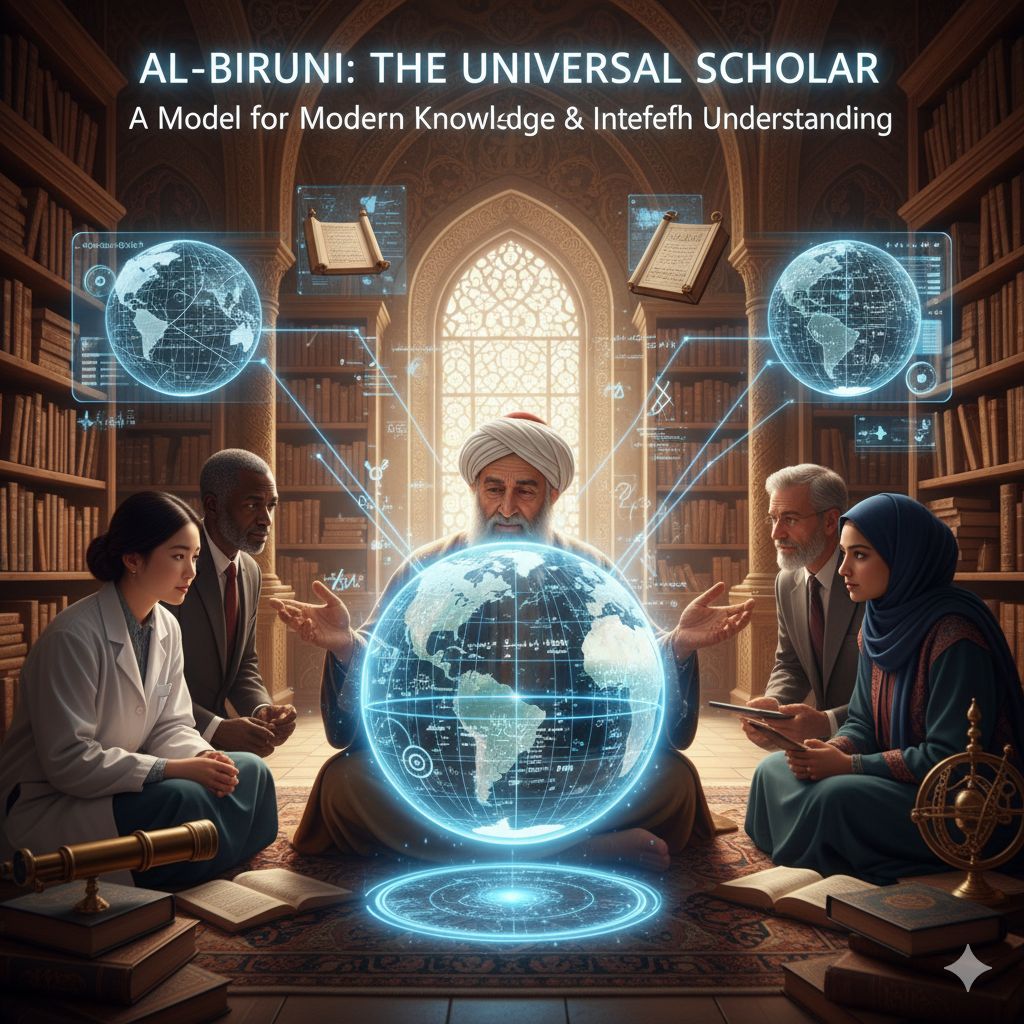In the heart of the 10th century, when the world was divided by kingdoms and creeds, a single man dared to believe that knowledge had no borders. His name was Abu Rayhan al-Biruni — the Universal Scholar — born in 973 CE in Khwarezm (modern-day Uzbekistan), a land where science and philosophy bloomed under the torch of Islamic learning.
Al-Biruni was not content with knowing one field; he sought to know everything — the stars above, the minerals beneath, the cultures of distant peoples, and the sacred texts of every faith. He was a mathematician, astronomer, geographer, physicist, linguist, and historian, but more than that — he was a bridge between civilizations.
While Europe stumbled through the early Middle Ages, Al-Biruni measured the Earth’s radius with astonishing accuracy — a calculation so precise that it differs from modern values by less than 1%. He charted eclipses, designed astronomical instruments, and studied the motion of planets centuries before Galileo or Copernicus.
But Al-Biruni’s brilliance extended far beyond science. In India, he immersed himself in Sanskrit texts, studying Hinduism with the same respect he gave to Greek, Persian, and Islamic traditions. His masterpiece, Kitab al-Hind (The Book of India), remains one of the most objective cross-cultural studies ever written — a tribute to intellectual honesty and empathy.
To Al-Biruni, truth was not owned by one people, one language, or one religion. It was universal, and every civilization held a fragment of it.
“The search for truth is the noblest path of worship,” he once wrote.
In a world fractured by ignorance and pride, Al-Biruni became the conscience of knowledge — reminding humanity that wisdom grows not in isolation, but through understanding others.
Early Life and Education – The Formation of a Polymath
Al-Biruni was born in 973 CE in the ancient city of Kath, the capital of the Khwarezm region — a vibrant crossroads of trade, science, and culture that connected Persia, India, and Central Asia. The city was a melting pot of civilizations, where Arabic, Persian, Greek, and Sanskrit ideas converged like tributaries feeding a single river of knowledge.
From an early age, the young Abu Rayhan showed signs of rare genius. His curiosity was not confined to books; he questioned the stars, the shape of shadows, and the rhythm of the seasons. He would spend nights observing celestial movements, measuring the changing positions of planets and the moon. By the age of 17, he was already composing his first treatises on astronomical observations and mathematical calculations — works that would later astonish scholars across the Islamic world.
Khwarezm, during his youth, was under the patronage of the Ma’munid dynasty, known for supporting scholars and scientists. It was here that Al-Biruni came into contact with other great minds of his time, including Ibn Sina (Avicenna), the celebrated philosopher and physician. The intellectual exchanges between these two prodigies were both fierce and fruitful — debates that shaped not only their personal philosophies but the course of Islamic science itself.
Al-Biruni studied under some of the most distinguished teachers in mathematics, geometry, and astronomy. He mastered Arabic and Persian, later learning Greek, Syriac, and Sanskrit, not for prestige but for understanding. He believed that language was the key to truth, and one must “hear the words of a people in their own tongue” to truly grasp their wisdom.
By his twenties, Al-Biruni was already known as a “walking encyclopedia” — a scholar whose intellect defied limits. His early works included groundbreaking studies on geodesy (the measurement of the Earth), trigonometry, and astrolabe construction, reflecting both his analytical rigor and his sense of wonder at the universe’s order.
But his thirst for knowledge was not content with theory. He wanted to see the world himself, to test what others had written, and to measure what others had merely imagined.
This restless curiosity would soon carry him far beyond Khwarezm — into lands of new faiths, strange skies, and unfamiliar stars.
It was the beginning of a journey that would make Al-Biruni the “Universal Scholar” — a man who charted not only the heavens but the map of human understanding itself.
Scientific Contributions – Measuring the Universe and the Earth
In an age when most of the world still gazed upward in awe at the heavens without understanding them, Al-Biruni sought not only to look — but to measure. His science was not built on myths or superstition, but on observation, experiment, and mathematics — a revolutionary approach that placed him centuries ahead of his time.
He believed that truth must be verified through proof — that knowledge without evidence was no better than conjecture. “We must test what we believe, and believe only what we can test,” he wrote — a declaration of scientific integrity that would later become the cornerstone of the modern scientific method.
🌍 Measuring the Earth’s Radius – The Genius on the Mountain
One of Al-Biruni’s most astounding achievements was his calculation of the Earth’s radius and circumference. Without modern tools or satellites, he devised a remarkably accurate method using simple geometry and trigonometry.
He climbed a high mountain near the plains of present-day Pakistan and measured the angle of depression to the horizon. By knowing the height of the mountain and applying mathematical formulas, he calculated the Earth’s radius to be 6,339.6 kilometers — only a few hundred kilometers off the value accepted today.
This was not just mathematics; it was vision made tangible — proof that intellect could reach the scale of creation itself. His calculation predated the use of telescopes by 600 years and the work of European astronomers by almost a millennium.
🔭 Astronomy – Mapping the Heavens with Mathematical Precision
For Al-Biruni, the cosmos was a divine clockwork — precise, orderly, and harmonious. He charted the positions of planets, studied eclipses, and explored the rotation of the Earth. Unlike many scholars of his age, he openly questioned the geocentric model (the idea that Earth was the center of the universe).
While he did not fully endorse heliocentrism, his writings hinted at it, as he noted that mathematical simplicity favored the Sun-centered model — an intuition that would not be publicly accepted until Copernicus, 500 years later.
He also constructed and refined astrolabes — ancient devices used to measure the positions of celestial bodies — and documented their designs in precise technical detail. His treatises on trigonometry, spherical geometry, and planetary motion remain references of astounding mathematical clarity.
🧭 Geography and Geodesy – Mapping the Known World
Al-Biruni’s genius extended to the surface of the Earth as well. His Kitab al-Jamahir fi Ma’rifat al-Jawahir detailed not only minerals and metals but also the geographical structure of the known world.
He was among the first to describe latitude and longitude scientifically, and to advocate for using triangulation — a geometric method still used today in surveying and satellite positioning.
In his magnum opus Tahdid Nihayat al-Amakin (“Determination of the Coordinates of Places for the Correction of Distances”), he listed the coordinates of hundreds of cities across the Islamic world and beyond, making him the father of modern geographical mapping.
🧪 Science as Worship
For Al-Biruni, scientific exploration was not a rebellion against faith — it was an act of devotion. He saw the laws of physics and mathematics as the language of God’s creation, and studying them as a way to understand divine wisdom.
“The scholar seeks truth in all directions,” he wrote, “for the truth belongs not to one people, but to all who seek it with sincerity.”
Through his intellect, Al-Biruni united heaven and earth, science and spirituality, numbers and meaning. He showed that reason and revelation were not rivals — they were mirrors of the same truth.
Cultural Exploration and Interfaith Understanding – The Book of India
When the dust of empires settled and the clash of civilizations filled the air, Al-Biruni did something few men of power or intellect dared to do —
he listened.
During his years in the Indian subcontinent, surrounded by languages, beliefs, and traditions far removed from his homeland of Khwarezm, he did not come as a conqueror nor a missionary. He came as a seeker of truth — a bridge between worlds.
It was there, amid the temples and libraries of ancient India, that he began his monumental work:
📜 “Kitab al-Hind” (The Book of India).
📚 A Masterpiece of Comparative Civilization
Unlike any book written before it, Kitab al-Hind was not a traveler’s journal or a conqueror’s report — it was a dialogue of civilizations.
Al-Biruni immersed himself in Sanskrit, studied Hindu philosophy, and engaged directly with Indian scholars. He sought not to judge, but to understand.
He wrote in Arabic but preserved Indian concepts in their own terms, refusing to distort them through foreign interpretation. He compared Indian mathematics, astronomy, logic, and metaphysics with their Greek, Persian, and Islamic counterparts — showing that truth was universal, shining through every culture in different forms.
In an age dominated by religious exclusivity, Al-Biruni’s voice was revolutionary. He described Hinduism, Buddhism, and other Indian faiths with profound respect, noting both differences and shared philosophical foundations.
“The Hindus and the Muslims,” he observed, “though differing in language and customs, are united in the pursuit of wisdom.”
🕊️ The Birth of Cross-Cultural Understanding
Al-Biruni’s approach made him the first true anthropologist — centuries before the term was invented. He applied scientific observation to culture itself, treating customs and beliefs not as curiosities, but as human expressions of meaning.
He lived among the people, learned their dialects, recorded their festivals, and analyzed their calendars. His respect for Indian intellectual tradition inspired later historians, linguists, and scientists to adopt cross-cultural methodologies — from medieval Europe to the Enlightenment.
Through Kitab al-Hind, he taught the world that understanding another culture is not achieved through dominance, but through dialogue.
His book remains one of the earliest and most comprehensive studies of a foreign civilization, standing as a symbol of tolerance and intellectual humility.
🌐 Legacy in the Modern World
Al-Biruni’s worldview anticipated the ideals of the modern age — the global exchange of knowledge, the unity of science and philosophy, and the respectful coexistence of faiths.
His writings influenced later Islamic scholars, European orientalists, and modern historians alike.
Today, as the world grapples with divisions of culture, creed, and nation, his life whispers across time:
“Truth is not owned by one people — it belongs to all who seek it without pride.”
Through him, science gained a conscience, and scholarship found its soul.
🌍 Legacy and Influence on Modern Science and Thought
When history writes the names of the men who shaped civilization’s understanding of the universe, Al-Biruni stands among the brightest — not as a man bound by his age, but as a mind ahead of all ages.
Centuries before the Renaissance, before telescopes and compasses guided the world, Al-Biruni had already drawn a map of human knowledge that spanned the heavens and the earth.
🧭 The Scientific Visionary Ahead of His Time
In his astronomical studies, he calculated the circumference of the Earth with stunning accuracy — a result that modern science confirmed nearly a thousand years later.
Using nothing but geometry, observation, and a sharp mind, he measured distances and angles to deduce the planet’s true scale, proving that reason could measure the infinite.
He also proposed the Earth’s rotation on its axis, centuries before Copernicus, and studied solar and lunar eclipses, planetary motion, and the structure of time through advanced astronomical tables.
His works — such as Al-Qanun al-Masudi (The Mas’udi Canon) — combined mathematical precision with philosophical reflection, blending observation and metaphysics into one seamless discipline.
Where others saw science and faith in conflict, Al-Biruni saw them in harmony — both as paths to understanding the Divine order of creation.
🌐 A Universal Scholar
Al-Biruni’s genius was not confined to one field. He explored geology, geography, pharmacology, and anthropology with equal brilliance. His study of minerals laid early foundations for earth sciences.
He compared cultures, religions, and calendars, showing that time itself was perceived differently across civilizations — a radical concept in his era.
In medicine, he analyzed the properties of plants and minerals, pioneering a scientific approach to pharmacology. In mathematics, he developed innovative techniques in trigonometry and calculus-like reasoning, centuries before Newton or Leibniz.
But perhaps his greatest legacy lies not in the number of his discoveries — but in how he discovered.
He combined empirical observation with intellectual humility, reminding scholars that true science begins where arrogance ends.
“The road to knowledge,” he wrote, “is long and difficult, but the seeker of truth must be patient, humble, and open to correction.”
🔭 The Torch Passed to Future Generations
Al-Biruni’s works traveled through time — influencing both the Islamic Golden Age and the later European Enlightenment.
His methods of measurement and experimentation inspired scientists like Copernicus, Kepler, and Galileo, while his cross-cultural analyses paved the way for anthropology and comparative religion in modern academia.
Even today, his spirit breathes in the laboratories of physics, the observatories of astronomy, and the classrooms where scholars debate culture and belief.
In an era when walls divide and ideologies clash, Al-Biruni’s life stands as a beacon of intellectual unity — a reminder that knowledge has no borders, and truth has no language but sincerity.
🌠 Eternal Legacy
When asked what he desired most, Al-Biruni once said:
“To know the causes of things — not for pride, but for wonder.”
That wonder became his legacy.
It is the same curiosity that drives every explorer who looks up at the stars, every scientist who asks why, and every human who believes that understanding is a form of worship.
Through Al-Biruni, the Islamic Golden Age gave birth to a timeless idea:
that the universe is a book — and every page of it leads us closer to truth.
✨ Conclusion: The Timeless Mind of Al-Biruni
As centuries unfold, many names fade into the dust of forgotten chronicles — but Al-Biruni continues to rise above time, his brilliance undimmed by the passage of ages.
He was not merely a scholar who recorded facts; he was a philosopher who searched for meaning within them.
In his quest for truth, he transcended the narrow boundaries of religion, nation, and era.
He studied Hindu scriptures with the same devotion he gave to Greek philosophy and Islamic theology, recognizing that all knowledge leads back to the same Creator.
For Al-Biruni, science was not rebellion against faith — it was faith in action.
To study the motion of stars, to measure the Earth, to catalog minerals, to understand other cultures — all of this, to him, was a form of worship, a recognition of divine order manifest in nature.
🕰 The Mirror of a Civilization
Al-Biruni represents the pinnacle of the Islamic Golden Age, a time when curiosity was sacred, and knowledge was a bridge — not a barrier — between civilizations.
He embodied the ideal of the universal scholar — fluent in multiple languages, conversant in every science, and deeply ethical in his pursuit of truth.
In an age of division, his works whisper a timeless message:
that wisdom belongs not to any one people, but to all of humanity;
that the universe is vast enough for every faith, every idea, and every seeker of knowledge.
🔮 Lessons for the Modern World
Today, as science accelerates beyond imagination and societies struggle with polarization, Al-Biruni’s legacy offers balance.
He teaches that progress without humility is chaos, and faith without inquiry is blindness.
His spirit invites us to look again — not just outward to the stars, but inward to the conscience that drives discovery.
He stands as proof that the light of intellect and the warmth of belief can coexist — that the mind and soul, when united, can reach both the heavens and the heart of truth.
“The seeker of knowledge,” wrote Al-Biruni, “must be like a lover of truth — tireless, patient, and faithful until the end.”
And faithful he remained — to reason, to faith, to the idea that every discovery is a prayer answered through perseverance.
Centuries later, when scientists launch satellites, map galaxies, or decode the Earth’s secrets, they walk the path Al-Biruni once illuminated.
His pen drew the first lines of that eternal equation between wonder and understanding, between God and knowledge.
He was, and remains, the bridge between heaven and earth — the universal scholar who made knowledge divine.











